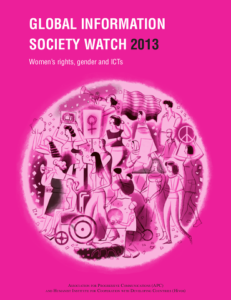
GISWatch 2013 Gender and ICTs Cover
The internet, as a medium and as a milieu where people, information and modes of consumption connect, has achieved a paramount role for the exercise of sexuality. Online dating, matchmaking and casual encounters, porn, sexual health and education, online commerce for sexual goods, escort services, sex rights activism, and the manifestation of sexual identities and communities, all represent a fruition of interactions, stimuli and exchanges on the internet. That these activities are understood as “sexual” means that they are subject to regulation and disciplining. When it comes to sex and sexuality, the rules about what people can or cannot do, and the norms by which people learn when, where, how and with whom they should do it, respond to the logic of what Michel Foucault called the “sexuality device”. [1] This functions as a medium for the production of truth about the self, under a regime of power and knowledge whereby populations are administered.
The internet and the virtualisation processes that it engenders are mechanisms intrinsically related to capitalist society, liberal modernity, and relations where, in theory, subjects are free to express their “inner truth”. Online interaction has been characterised as a paradigm of free expression – anarchic, resistant to regulation. However, like sexuality, the internet has become yet one more vehicle for social segmentation and discourses about the self.
GISWatch 2013 Thematic Report – Sexual rights and internet regulation can be downloaded here